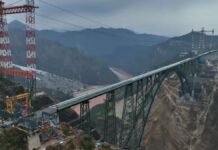
New Delhi: After Germany and China, now hydrogen trains will be operated in India under the ‘Make in India’ scheme. By December 2023, these trains will start for passengers. Railway Minister Ashwini Vaishnav had said a few months ago that a hydrogen train is ready. This train will be environmentally friendly and will not emit carbon dioxide at all. However, running this train will cost 27 percent more than a diesel engine.
Let us tell you that these trains will be known as Vande Metro. The speed of hydrogen trains can go up to 160 kilometers per hour. However, the tracks in India cannot handle this much speed, so they will be run at slightly lower speeds. Ashwini Vaishnav told that its trial run will be done first in Haryana. This trial run will be between Sonipat and Jind.
Stations will also be renovated
Union Minister Ashwini Vaishnav has said that Indian Railways is making a prototype of a hydrogen fuel-based train in the Northern Railway workshop. He also told that 1275 stations have to be renovated to avoid any damage to these trains. Let us tell you that in this budget, the central government has made a provision of Rs 2.41 lakh crore for the Indian Railways.
Where will the operation start
First of all, there is a plan to run these trains on the heritage route. For example, their operation can be started on routes like Darjeeling Himalayan Railway, Nilgiri Mountain Railway, Kalka Shimla Railway, Kangra Valley, and Marwar-Devgarh Madaria. These trains not only reduce air pollution but also reduce noise a lot, which helps in fighting noise pollution as well. Apart from this, hydrogen can be made naturally.

Operation in Germany for 5 years
Germany had spent about $80 million on the hydrogen train project. It started on regional lines (eg local routes here). At present, 27 hydrogen trains are operated in major cities in Germany. Apart from this, hydrogen train is operated in China. Here it is run at a speed of 160 km per hour to cover a distance of 600 km.

















































